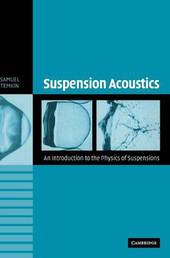
|
Suspension Acoustics: An Introduction to the Physics of Suspensions
Hardback
Main Details
| Title |
Suspension Acoustics: An Introduction to the Physics of Suspensions
|
| Authors and Contributors |
By (author) Samuel Temkin
|
| Physical Properties |
| Format:Hardback | | Pages:418 | | Dimensions(mm): Height 244,Width 170 |
|
| Category/Genre | Industrial chemistry
Mechanical engineering |
|---|
| ISBN/Barcode |
9780521847575
|
| Classifications | Dewey:541.34 |
|---|
| Audience | | Professional & Vocational | |
|---|
|
Publishing Details |
| Publisher |
Cambridge University Press
|
| Imprint |
Cambridge University Press
|
| Publication Date |
25 July 2005 |
| Publication Country |
United Kingdom
|
Description
Suspension Acoustics: An Introduction to the Physics of Suspensions is an introduction to the physics of suspensions of bubbles, droplets, and solid particles in both gases and fluids. Rather than treating each combination separately, a unified approach is used that permits most particle-fluid combination types to be discussed together. To do this, the book first presents a detailed discussion of the basic particle motions that small particles can sustain, paying particular attention to translations and pulsations, and to the thermal effects that occur as a result of those motions. The book then introduces the reader to the dynamics and thermodynamics of suspensions, with acoustic motions providing the main focus in the latter part of the book. The important acoustic problems of attenuation and dispersion are discussed from several fundamental perspectives. The book concludes with applications of acoustic techniques to the characterization and modification of suspensions by means of acoustic waves.
Author Biography
Samuel Temkin is Professor Emeritus, Department of Mechanical Engineering, Rutgers University. Before joining the faculty at Rutgers Professor Temkin was a Senior Scientist at Bolt, Bernack and Newman in Cambridge, MA. His research has been related to physical acoustics, droplet dynamics, and cloud physics. He is the author of Elements of Acoustics, and has held visiting faculty positions at a number of universities world-wide.
Reviews'... the analyses included in the text are all self contained; a student can work out all of them. I feel it is this analytical 'no nonsense' style that makes this book endearing in this age of easy computation. It is a good reminder of how analytical solutions of simplified systems can provide useful insights. I would recommend that all serious students and experienced researchers of the field keep this volume handy in their collections.' Kausik Sarkar, Journal of the Acoustical Society of America
|